动词三:非谓语动词做宾语巧学妙记口诀
- 格式:doc
- 大小:36.50 KB
- 文档页数:3
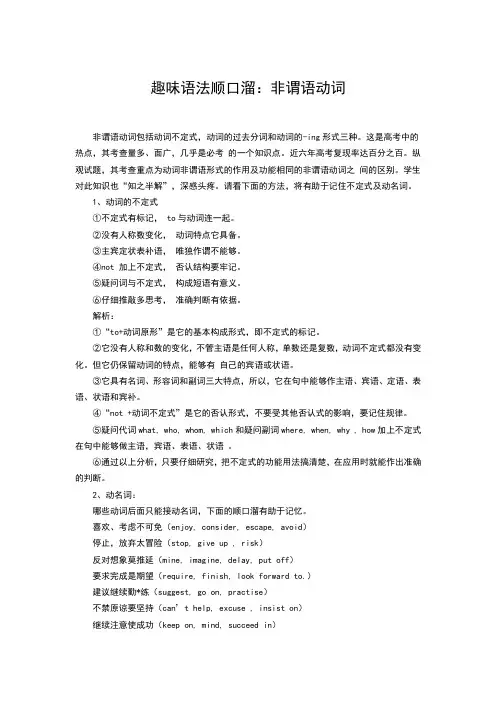
趣味语法顺口溜:非谓语动词非谓语动词包括动词不定式,动词的过去分词和动词的-ing形式三种。
这是高考中的热点,其考查量多、面广,几乎是必考的一个知识点。
近六年高考复现率达百分之百。
纵观试题,其考查重点为动词非谓语形式的作用及功能相同的非谓语动词之间的区别。
学生对此知识也“知之半解”,深感头疼。
请看下面的方法,将有助于记住不定式及动名词。
1、动词的不定式①不定式有标记, to与动词连一起。
②没有人称数变化,动词特点它具备。
③主宾定状表补语,唯独作谓不能够。
④not 加上不定式,否认结构要牢记。
⑤疑问词与不定式,构成短语有意义。
⑥仔细推敲多思考,准确判断有依据。
解析:①“to+动词原形”是它的基本构成形式,即不定式的标记。
②它没有人称和数的变化,不管主语是任何人称,单数还是复数,动词不定式都没有变化。
但它仍保留动词的特点,能够有自己的宾语或状语。
③它具有名词、形容词和副词三大特点,所以,它在句中能够作主语、宾语、定语、表语、状语和宾补。
④“not +动词不定式”是它的否认形式,不要受其他否认式的影响,要记住规律。
⑤疑问代词what, who, whom, which和疑问副词where, when, why , how加上不定式在句中能够做主语,宾语、表语、状语。
⑥通过以上分析,只要仔细研究,把不定式的功能用法搞清楚,在应用时就能作出准确的判断。
2、动名词:哪些动词后面只能接动名词,下面的顺口溜有助于记忆。
喜欢、考虑不可免(enjoy, consider, escape, avoid)停止,放弃太冒险(stop, give up , risk)反对想象莫推延(mine, imagine, delay, put off)要求完成是期望(require, finish, look forward to.)建议继续勤*练(suggest, go on, practise)不禁原谅要坚持(can’t help, excuse , insist on)继续注意使成功(keep on, mind, succeed in)。
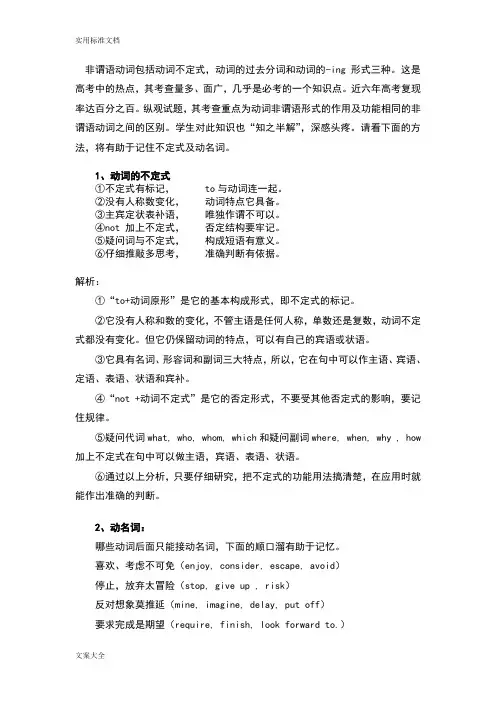
非谓语动词包括动词不定式,动词的过去分词和动词的-ing形式三种。
这是高考中的热点,其考查量多、面广,几乎是必考的一个知识点。
近六年高考复现率达百分之百。
纵观试题,其考查重点为动词非谓语形式的作用及功能相同的非谓语动词之间的区别。
学生对此知识也“知之半解”,深感头疼。
请看下面的方法,将有助于记住不定式及动名词。
1、动词的不定式①不定式有标记,to与动词连一起。
②没有人称数变化,动词特点它具备。
③主宾定状表补语,唯独作谓不可以。
④not 加上不定式,否定结构要牢记。
⑤疑问词与不定式,构成短语有意义。
⑥仔细推敲多思考,准确判断有依据。
解析:①“to+动词原形”是它的基本构成形式,即不定式的标记。
②它没有人称和数的变化,不管主语是任何人称,单数还是复数,动词不定式都没有变化。
但它仍保留动词的特点,可以有自己的宾语或状语。
③它具有名词、形容词和副词三大特点,所以,它在句中可以作主语、宾语、定语、表语、状语和宾补。
④“not +动词不定式”是它的否定形式,不要受其他否定式的影响,要记住规律。
⑤疑问代词what, who, whom, which和疑问副词where, when, why , how 加上不定式在句中可以做主语,宾语、表语、状语。
⑥通过以上分析,只要仔细研究,把不定式的功能用法搞清楚,在应用时就能作出准确的判断。
2、动名词:哪些动词后面只能接动名词,下面的顺口溜有助于记忆。
喜欢、考虑不可免(enjoy, consider, escape, avoid)停止,放弃太冒险(stop, give up , risk)反对想象莫推延(mine, imagine, delay, put off)要求完成是期望(require, finish, look forward to.)建议继续勤*练(suggest, go on, practise)不禁原谅要坚持(can’t help, excuse , insist on)继续注意使成功(keep on, mind, succeed in)1. Everyone in our class was working hard and doing what we could _______a good college.A. enterB. to enterC. enteringD. entered【陷阱】容易误选A。
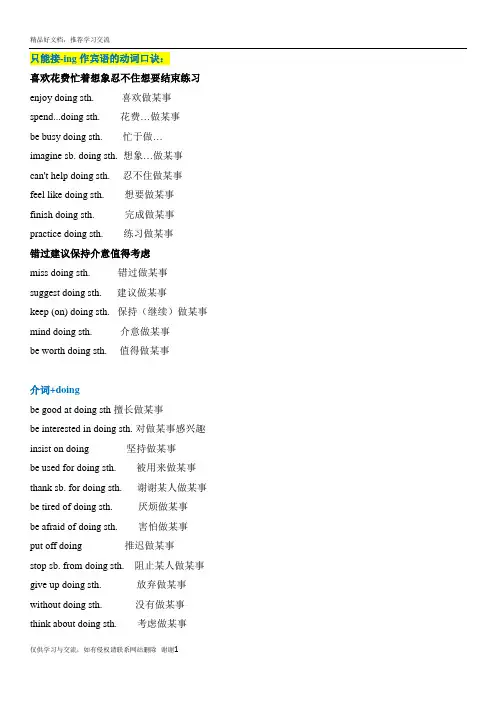
只能接-ing作宾语的动词口诀:喜欢花费忙着想象忍不住想要结束练习enjoy doing sth. 喜欢做某事spend...doing sth. 花费…做某事be busy doing sth. 忙于做…imagine sb. doing sth. 想象…做某事can't help doing sth. 忍不住做某事feel like doing sth. 想要做某事finish doing sth. 完成做某事practice doing sth. 练习做某事错过建议保持介意值得考虑miss doing sth. 错过做某事suggest doing sth. 建议做某事keep (on) doing sth. 保持(继续)做某事mind doing sth. 介意做某事be worth doing sth. 值得做某事介词+doingbe good at doing sth擅长做某事be interested in doing sth. 对做某事感兴趣insist on doing 坚持做某事be used for doing sth. 被用来做某事thank sb. for doing sth. 谢谢某人做某事be tired of doing sth. 厌烦做某事be afraid of doing sth. 害怕做某事put off doing 推迟做某事stop sb. from doing sth. 阻止某人做某事give up doing sth. 放弃做某事without doing sth. 没有做某事think about doing sth. 考虑做某事What ∕ How about doing 做某事怎么样?此to 非彼tolook forward to doing sth. (盼望)pay attention to doing sth. (注意)be used to doing sth. (习惯于)prefer doing sth to doing sth.(更喜欢)devote to doing sth(致力于)make a contribution to doing (做贡献)只能接不定式作宾语的动词口诀:决定想做计划需要同意,能做被用来做的事decide to do sth. 决定做某事want ∕ would like to do sth. 想做某事plan to do sth. 计划做某need to do sth. 需要做某事agree to do sth. 同意做某事afford to do 能做某事be used to do 被用来做迫不及待下决心做过去常常未能做的事被用来做can’t wait to do 迫不及待地要做某事make up one’s mind to do 下决心做某事used to do 过去常常做某事fail to do 未能做某事接不定式作宾语补足语的动词口诀:请求与命令ask sb. to do sth. 请求某人做某事tell sb. to do sth. 命令某人做某事想要邀请期待鼓励与建议want sb. to do sth. 想要某人做某事invite sb. to do sth. 邀请某人做某事expect sb. to do sth. 期待某人做某事encourage sb. to do sth. 鼓励某人做某事advise sb. to do sth. 建议某人做某事答应告诫允许提醒和帮助promise sb. to do 答应某人做某事warn sb. not to do sth. 告诫某人做某事allow sb. to do sth. 允许某人做某事remind sb. to do sth. 提醒某人做某事help sb. (to) do sth. 帮助某人做某事省略to的情况:使役动词和感官动词后:一感二听三让四看 feel/ hear, listen to/ let,make, have, / look at, see, watch, noticehad better (not)do sth. 最好(不)做…why not /why don’t you do sth为什么不做…?help sb.(to)do sth Would rather宁愿做…would you please 情态动词+do 助动词+do感官动词see, watch, look at, notice, hear, listen to, feel+ do表示动作的全过程,强调做过这件事或单纯说明谁在干+doing 表示动作不是全过程,强调正在做某事,指看见的一瞬间某人正在做注意:被动语态中不能省去to。
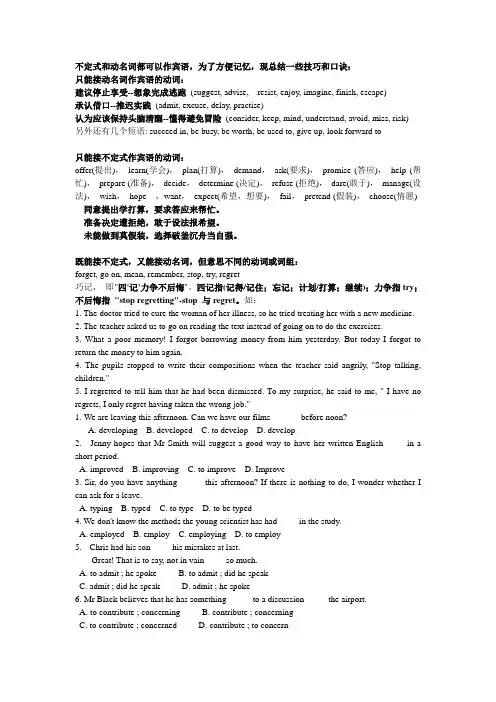
不定式和动名词都可以作宾语,为了方便记忆,现总结一些技巧和口诀:只能接动名词作宾语的动词:建议停止享受--想象完成逃跑(suggest, advise, resist, enjoy, imagine, finish, escape)承认借口--推迟实践(admit, excuse, delay, practise)认为应该保持头脑清醒--懂得避免冒险(consider, keep, mind, understand, avoid, miss, risk)另外还有几个短语: succeed in, be busy, be worth, be used to, give up, look forward to只能接不定式作宾语的动词:offer(提出),learn(学会),plan(打算),demand,ask(要求),promise (答应),help (帮忙),prepare (准备),decide,determine (决定),refuse (拒绝),dare(敢于),manage(设法),wish,hope ,want,expect(希望,想要),fail,pretend (假装),choose(情愿) 同意提出学打算,要求答应来帮忙。
准备决定遭拒绝,敢于设法报希望。
未能做到莫假装,选择破釜沉舟当自强。
既能接不定式,又能接动名词,但意思不同的动词或词组:forget, go on, mean, remember, stop, try, regret巧记,即"四'记'力争不后悔"。
四记指(记得/记住;忘记;计划/打算;继续);力争指try;不后悔指"stop regretting"-stop 与regret。
如:1. The doctor tried to cure the woman of her illness, so he tried treating her with a new medicine.2. The teacher asked us to go on reading the text instead of going on to do the exercises.3. What a poor memory! I forgot borrowing money from him yesterday. But today I forgot to return the money to him again.4. The pupils stopped to write their compositions when the teacher said angrily, "Stop talking, children."5. I regretted to tell him that he had been dismissed. To my surprise, he said to me, " I have no regrets, I only regret having taken the wrong job."1.We are leaving this afternoon. Can we have our films ______ before noon?A. developingB. developedC. to developD. develop2. Jenny hopes that Mr Smith will suggest a good way to have her written English ____ in a short period.A. improvedB. improvingC. to improveD. Improve3. Sir, do you have anything _____ this afternoon? If there is nothing to do, I wonder whether I can ask for a leave.A. typingB. typedC. to typeD. to be typed4. We don't know the methods the young scientist has had ____ in the study.A. employedB. employC. employingD. to employ5.--Chris had his son ____ his mistakes at last.-- Great! That is to say, not in vain ____ so much.A. to admit ; he spokeB. to admit ; did he speakC. admit ; did he speakD. admit ; he spoke6.Mr Black believes that he has something _____ to a discussion_____ the airport.A. to contribute ; concerningB. contribute ; concerningC. to contribute ; concernedD. contribute ; to concern。

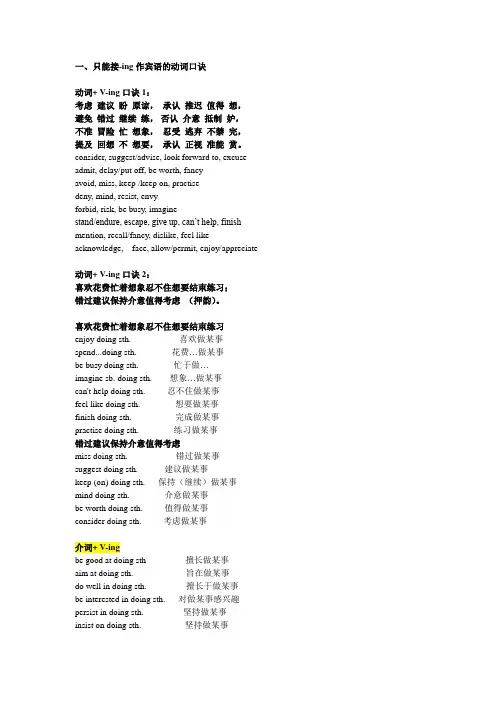
一、只能接-ing作宾语的动词口诀动词+ V-ing口诀1:考虑建议盼原谅,承认推迟值得想,避免错过继续练,否认介意抵制妒,不准冒险忙想象,忍受逃弃不禁完,提及回想不想要,承认正视准能赏。
consider, suggest/advise, look forward to, excuse admit, delay/put off, be worth, fancyavoid, miss, keep /keep on, practisedeny, mind, resist, envyforbid, risk, be busy, imaginestand/endure, escape, give up, can’t help, finish mention, recall/fancy, dislike, feel like acknowledge, face, allow/permit, enjoy/appreciate动词+ V-ing口诀2:喜欢花费忙着想象忍不住想要结束练习;错过建议保持介意值得考虑(押韵)。
喜欢花费忙着想象忍不住想要结束练习enjoy doing sth. 喜欢做某事spend...doing sth. 花费…做某事be busy doing sth. 忙于做…imagine sb. doing sth. 想象…做某事can't help doing sth. 忍不住做某事feel like doing sth. 想要做某事finish doing sth. 完成做某事practise doing sth. 练习做某事错过建议保持介意值得考虑miss doing sth. 错过做某事suggest doing sth. 建议做某事keep (on) doing sth. 保持(继续)做某事mind doing sth. 介意做某事be worth doing sth. 值得做某事consider doing sth. 考虑做某事介词+ V-ingbe good at doing sth 擅长做某事aim at doing sth. 旨在做某事do well in doing sth. 擅长于做某事be interested in doing sth. 对做某事感兴趣persist in doing sth. 坚持做某事insist on doing sth. 坚持做某事keep on doing sth. 继续做某事be used for doing sth. 被用来做某事thank sb. for doing sth. 谢谢某人做某事think of doing sth. 考虑做某事be tired of doing sth. 厌烦做某事be afraid of doing sth. 害怕做某事be capable of doing sth. 能够做某事be fond of doing sth. 喜欢做某事put off doing sth. 推迟做某事leave off doing sth. 停止做某事set about doing sth. 开始做某事stop sb. from doing sth. 阻止某人做某事give up doing sth. 放弃做某事without doing sth. 没有做某事think about doing sth. 考虑做某事What ∕ How about doing sth. 做某事怎么样?此to 非彼tobe used to doing sth. 习惯于……object to doing sth. 反对……devote oneself to doing sth. 致力于;献身于…devote to doing sth 致力于……stick to doing sth. 坚持做某事respond to doing sth. 对……作出反应look forward to doing sth. 期望做某事see to doing sth. 确保做某事submit to doing sth. 屈服于做某事adapt to doing sth. 适应于做某事apply to doing sth. 应用于做某事accede to doing sth. 同意做某事get to doing sth. 开始做某事prefer doing A to doing B 更喜欢做A胜过做Bowe to doing sth. 归功于做某事adjust oneself to doing sth. 调整以适应……make a contribution to doing sth. 在…做贡献二、只能接不定式作宾语的动词口诀口诀1:同意提出做计划,要求答应来帮忙。
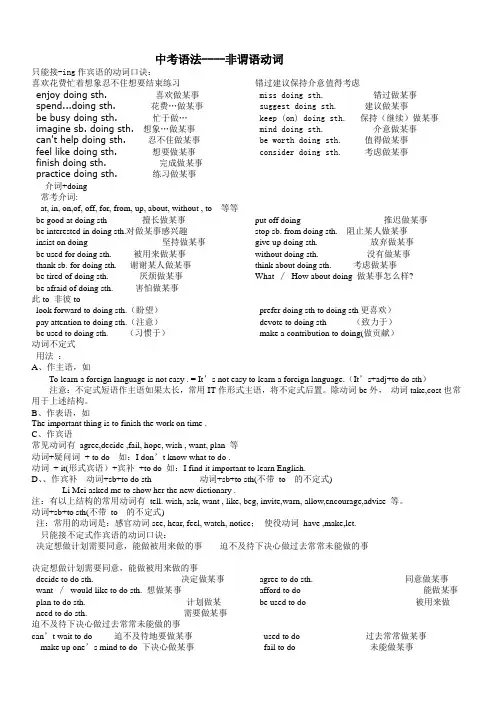
中考语法----非谓语动词只能接-ing作宾语的动词口诀:喜欢花费忙着想象忍不住想要结束练习enjoy doing sth. 喜欢做某事spend...doing sth. 花费…做某事be busy doing sth. 忙于做…imagine sb. doing sth. 想象…做某事can't help doing sth. 忍不住做某事feel like doing sth. 想要做某事finish doing sth. 完成做某事practice doing sth. 练习做某事错过建议保持介意值得考虑miss doing sth. 错过做某事suggest doing sth. 建议做某事keep (on) doing sth. 保持(继续)做某事 mind doing sth. 介意做某事be worth doing sth. 值得做某事consider doing sth. 考虑做某事介词+doing常考介词:at, in, on,of, off, for, from, up, about, without , to 等等be good at doing sth 擅长做某事be interested in doing sth.对做某事感兴趣insist on doing 坚持做某事be used for doing sth. 被用来做某事thank sb. for doing sth. 谢谢某人做某事be tired of doing sth. 厌烦做某事be afraid of doing sth. 害怕做某事put off doing 推迟做某事stop sb. from doing sth. 阻止某人做某事give up doing sth. 放弃做某事without doing sth. 没有做某事think about doing sth. 考虑做某事What ∕How about doing 做某事怎么样?此to 非彼tolook forward to doing sth.(盼望)pay attention to doing sth.(注意)be used to doing sth. (习惯于)prefer doing sth to doing sth更喜欢)devote to doing sth (致力于)make a contribution to doing(做贡献)动词不定式用法:A、作主语,如To learn a foreign language is not easy . = It’s not easy to learn a foreign language.(It’s+adj+to do sth)注意:不定式短语作主语如果太长,常用IT作形式主语,将不定式后置。
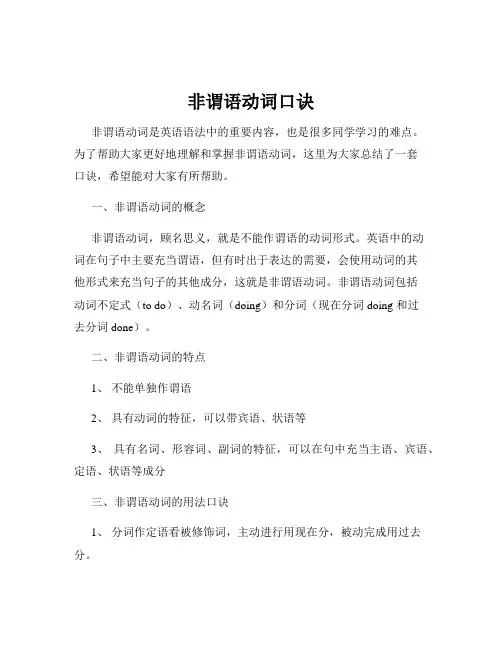
非谓语动词口诀非谓语动词是英语语法中的重要内容,也是很多同学学习的难点。
为了帮助大家更好地理解和掌握非谓语动词,这里为大家总结了一套口诀,希望能对大家有所帮助。
一、非谓语动词的概念非谓语动词,顾名思义,就是不能作谓语的动词形式。
英语中的动词在句子中主要充当谓语,但有时出于表达的需要,会使用动词的其他形式来充当句子的其他成分,这就是非谓语动词。
非谓语动词包括动词不定式(to do)、动名词(doing)和分词(现在分词 doing 和过去分词 done)。
二、非谓语动词的特点1、不能单独作谓语2、具有动词的特征,可以带宾语、状语等3、具有名词、形容词、副词的特征,可以在句中充当主语、宾语、定语、状语等成分三、非谓语动词的用法口诀1、分词作定语看被修饰词,主动进行用现在分,被动完成用过去分。
例如:The smiling girl is my sister(“smiling”表示“正在笑的”,与“girl”是主动关系,用现在分词)再如:The broken window needs to be repaired(“broken”表示“被打破的”,与“window”是被动关系,用过去分词)2、分词作状语看其与主语关系,主动进行用现在分,被动完成用过去分。
例如:Seeing from the top of the hill, we can have a better view (“seeing”与“we”是主动关系,用现在分词)又如:Seen from the top of the hill, the city looks beautiful(“seen”与“the city”是被动关系,用过去分词)3、不定式作目的状语常放句首,作后置定语与被修饰词有动宾关系。
例如:To catch the early bus, he got up early(“To catch”表示目的,放在句首)再如:I have a lot of work to do(“to do”作后置定语,与“work”有动宾关系,即“do work”)4、动名词作主语表一般、抽象动作,作宾语常跟某些动词短语。
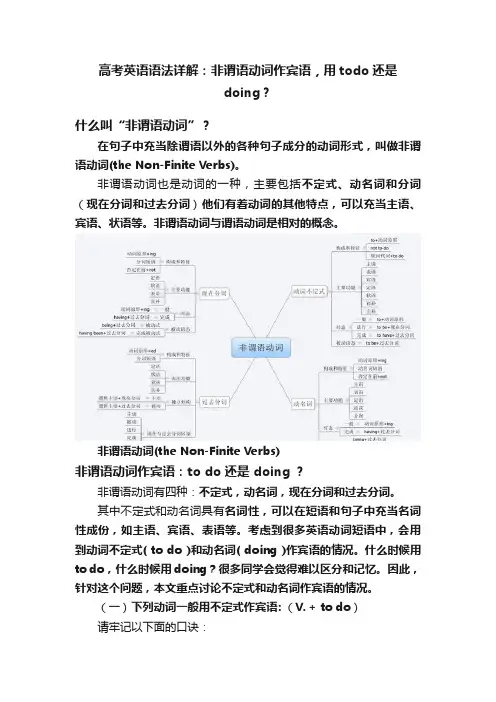
高考英语语法详解:非谓语动词作宾语,用todo还是doing?
什么叫“非谓语动词”? 在句子中充当除谓语以外的各种句子成分的动词形式,叫做非谓语动词(the Non-Finite Verbs)。 非谓语动词也是动词的一种,主要包括不定式、动名词和分词(现在分词和过去分词)他们有着动词的其他特点,可以充当主语、宾语、状语等。非谓语动词与谓语动词是相对的概念。
非谓语动词(the Non-Finite Verbs) 非谓语动词作宾语:to do 还是 doing ? 非谓语动词有四种:不定式,动名词,现在分词和过去分词。 其中不定式和动名词具有名词性,可以在短语和句子中充当名词性成份,如主语、宾语、表语等。考虑到很多英语动词短语中,会用到动词不定式( to do )和动名词( doing )作宾语的情况。什么时候用to do,什么时候用doing?很多同学会觉得难以区分和记忆。因此,针对这个问题,本文重点讨论不定式和动名词作宾语的情况。 (一)下列动词一般用不定式作宾语: (V. + to do) 请牢记以下面的口诀: 决心学会想希望,拒绝设法愿假装。 主动答应选计划,同意请求帮一帮。
decide / determine, learn,want, expect / hope / wish; refuse, manage,care, pretend; offer,promise,choose,plan; agree,ask / beg,help。
She pretended not to see me when I passed by. 当我经过时,她假装没看见我。 We agreed to meet here. 我们约好了在这里见面。 此外,afford,strive,happen,wait,threaten等也要用这定式作宾语。
(二)下列动词或词组一般用动名词作宾语: (V. + doing) 请牢记以下面的口诀:
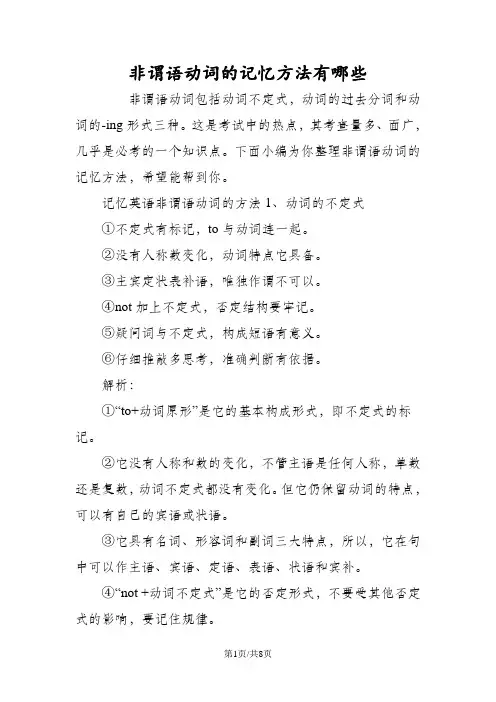
非谓语动词的记忆方法有哪些非谓语动词包括动词不定式,动词的过去分词和动词的-ing形式三种。
这是考试中的热点,其考查量多、面广,几乎是必考的一个知识点。
下面小编为你整理非谓语动词的记忆方法,希望能帮到你。
记忆英语非谓语动词的方法1、动词的不定式①不定式有标记,to与动词连一起。
②没有人称数变化,动词特点它具备。
③主宾定状表补语,唯独作谓不可以。
④not加上不定式,否定结构要牢记。
⑤疑问词与不定式,构成短语有意义。
⑥仔细推敲多思考,准确判断有依据。
解析:①“to+动词原形”是它的基本构成形式,即不定式的标记。
②它没有人称和数的变化,不管主语是任何人称,单数还是复数,动词不定式都没有变化。
但它仍保留动词的特点,可以有自己的宾语或状语。
③它具有名词、形容词和副词三大特点,所以,它在句中可以作主语、宾语、定语、表语、状语和宾补。
④“not +动词不定式”是它的否定形式,不要受其他否定式的影响,要记住规律。
⑤疑问代词what,who,whom,which和疑问副词where,when,why ,how加上不定式在句中可以做主语,宾语、表语、状语。
⑥通过以上分析,只要仔细研究,把不定式的功能用法搞清楚,在应用时就能作出准确的判断。
记忆英语非谓语动词的方法2、动名词哪些动词后面只能接动名词,下面的顺口溜有助于记忆。
喜欢、考虑不可免(enjoy,consider,escape,avoid) 停止,放弃太冒险(stop,give up ,risk)反对想象莫推延(mine,imagine,delay,put off)要求完成是期望(require,finish,look forward to.)建议继续勤练习(suggest,go on,practise)不禁原谅要坚持(can’t help,excuse ,insist on)继续注意使成功(keep on,mind,succeed in)非谓语动词英语学习口诀包含动名词、动词的不定时顺口溜非谓语动词包括动词不定式,动词的过去分词和动词的-ing形式三种。
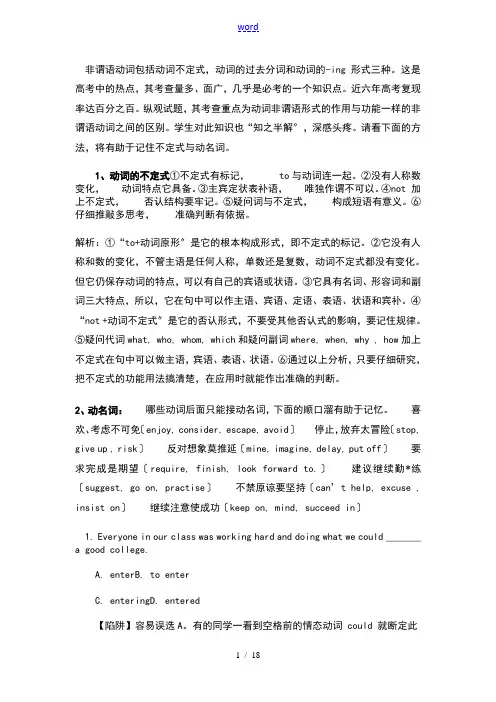
非谓语动词包括动词不定式,动词的过去分词和动词的-ing形式三种。
这是高考中的热点,其考查量多、面广,几乎是必考的一个知识点。
近六年高考复现率达百分之百。
纵观试题,其考查重点为动词非谓语形式的作用与功能一样的非谓语动词之间的区别。
学生对此知识也“知之半解〞,深感头疼。
请看下面的方法,将有助于记住不定式与动名词。
1、动词的不定式①不定式有标记,to与动词连一起。
②没有人称数变化,动词特点它具备。
③主宾定状表补语,唯独作谓不可以。
④not 加上不定式,否认结构要牢记。
⑤疑问词与不定式,构成短语有意义。
⑥仔细推敲多思考,准确判断有依据。
解析:①“to+动词原形〞是它的根本构成形式,即不定式的标记。
②它没有人称和数的变化,不管主语是任何人称,单数还是复数,动词不定式都没有变化。
但它仍保存动词的特点,可以有自己的宾语或状语。
③它具有名词、形容词和副词三大特点,所以,它在句中可以作主语、宾语、定语、表语、状语和宾补。
④“not +动词不定式〞是它的否认形式,不要受其他否认式的影响,要记住规律。
⑤疑问代词what, who, whom, which和疑问副词where, when, why , how加上不定式在句中可以做主语,宾语、表语、状语。
⑥通过以上分析,只要仔细研究,把不定式的功能用法搞清楚,在应用时就能作出准确的判断。
2、动名词:哪些动词后面只能接动名词,下面的顺口溜有助于记忆。
喜欢、考虑不可免〔enjoy, consider, escape, avoid〕停止,放弃太冒险〔stop, give up , risk〕反对想象莫推延〔mine, imagine, delay, put off〕要求完成是期望〔require, finish, look forward to.〕建议继续勤*练〔suggest, go on, practise〕不禁原谅要坚持〔can’t help, excuse , insist on〕继续注意使成功〔keep on, mind, succeed in〕1. Everyone in our class was working hard and doing what we could _______a good college.A. enterB. to enterC. enteringD. entered【陷阱】容易误选A。
巧学妙记 1、巧记动词不定式基本用法口诀 不定式有标记,to与动原连一起。 to do sth 没有人称数变化,动词特点它具备。 主宾定补表状语,唯独作谓不可以。 not加上不定式,否定结构要牢记。 not to do 疑问词与不定式,构成短语有意义。 what / how/ when/ where... to do 仔细推敲多思考,准确判断有依据,
2、巧记接不定式做宾语的动词 三个希望两答应(hope, wish, want, agree, promise) 一个要求莫拒绝(demand, refuse) 设法学会做决定(manage, learn, decide) 不要假装在选择(pretend, choose)
3、巧记接疑问词加to do做宾语的常见动词 学会忘记是有难处(learn, forget) 想知道就别来劝阻(wonder, know, advise) 展开讨论教人对付(show, discuss, teach) 弄清楚才决定告诉(find out, decide, tell)
4、巧记既可以跟动名词也可以跟不定式的动词 一旦开始莫后悔(begin, start, regret) 爱憎分明要切记(like, love, hate, remember, forget) 继续努力有打算(continue, try, mean) 三个需要由你选(need, want, require, prefer)
5、巧记后接省略to的不定式 一感(feel) 二听(listen to, hear) 三让(let, make, have) 四看(see, watch, look at, notice)
6、巧记少数后面只能用动名词做宾语的动词 喜欢考虑不可免(enjoy, consider, escape, avoid) 停止放弃太冒险(stop, give up, risk) 介意想象莫推延(mind, imagine, delay, put off) 要求完成是期望(require, finish, look forward to) 建议继续勤练习(suggest, go on, practise) 不禁原谅要坚持(can't help, excuse, insist on) 继续注意使成功(keep on, mind, succeed in) 动名词记忆口诀 考虑建议盼原谅consider\suggest \advise\look forward to \excuse 承认推迟没得想admit \delay \put off \fancy(想象,设想) 避免错过继续练avoid \miss \keep \practise 否认完成停欣赏deny \finish \enjoy \appreciate 不禁介意准逃亡can`t help \mind \allow \escape 禁止冒险凭想像forbid \risk \imagine
常见的直接接动词-ing形式的短语 feel like, give up, be used to, insist on, lead to, pay attention to, devote…to , stick to, object to, thanks to, thank you for, protect/prevent …from, be worth, succeed in, get down to, have some trouble /difficulty /problems (in), spend time(in)doing remember doing sth 记得曾经做过某事 remember to do sth 记住做某事 forget doing sth 忘记曾经做过某事 forget to do sth 忘记去做某事 regret doing 后悔做过某事 regret to do sth 后悔或遗憾地去做某事 stop doing 停止做某事 stop to do sth 停下来去做某事 try doing 试着做某事 try to do sth 尽力去做某事 mean to do sth 打算做某事 mean doing 意味着 can't help to do sth 不能帮助做某事 can't help doing sth 禁不住做某事 系动词 表感官的系动词:look, sound, taste, smell, feel(这些词用形容词作表语) 表似乎的系动词:seem, appear 表变化的系动词:become, get, turn, grow, make, come, go, fall, run 表依旧的系动词:remain, keep, stay, continue, stand, rest, lie, hold 可带名词作表语的系动词:become, make, look, sound, fall, prove, remain, turn (该词后接的单数名词前多不用冠词。如:He turned teacher.) C、动词搭配 ( ) 31. She enjoys __________ light music. A. to hear B. hearing C. to listen to D. listening to ( ) 32. I expected __________ your friend, but my car broke down on the way. A. I’ll meet B. meeting C. to meeting D. to meet ( ) 33. I remember _____ France when I was young. A. to visit B. visit C. visiting D. visited ( ) 34. I remember the house about an hour ago. A. to see him leave B. seeing him to leave C. seeing him leave D. to see him to leave ( ) 35. The children carefully but they nothing. A. listened, heard B. listening, hearing C. hear, listen D.hearing, listening ( ) 36. 1. I would appreciate __________ back this afternoon. A. you to call B. your calling C. you call D. you’re calling ( ) 37. He stopped_____ three years ago. Now he began __________ again. A. smoking, smoke B. to smoke, to smoke C.smoking, to smoke D. to smoke, smoking ( ) 38. Don’t this letter for me on your way to school. A. forget mailing B. forget mail C. forget to mail D. remember to mail ( ) 39. Don’t forget __________the lights when you go out. A. to turn on B. turning off C. to turn off D. turning on ( ) 40. –Why not ______ us to work as volunteers visiting the old people’s caring house? –Good idea! A. joins B. to join C. join D. joining ( ) 41. I dislike __________to the movies by myself. I would like ________ with others. A.go, to go B. going, going C. to go , going D.going, to go ( ) 42. He likes a detective because he wants to protect the innocent. A. working as B. work for C. to work D. working ( ) 43. -- You’re well-dressed today. -- Thank you. I want to a good impression the interviewer. A. give, on B. make, on C. make, to D. give, for ( ) 44. - Which sport do you like better, basketball or football? --I prefer basketball football. A. to play, to play B. play, than play C. playing, to playing D. to play, than play ( ) 45. Instead of _________ on a crowded bus, he prefers __________ a bicycle. A. ride, ride B. riding, to ride C. ride, to ride D. to ride, riding ( ) 46. –Have you thought of anything? --Yes. These clothes remind me my grandpa. A. of B. to C. for D. with ( ) 47. The sunglasses __________ me ¥300. You must __________ it. A. took, pay B. cost, pay for C. cost, spend D. spend, cost ( ) 48. It ________ me two hours to get there by bus. A. spent B. took C. used D. paid ( ) 49. The famous writer would like to _________ time in the beautiful countryside. A. spend B. cost C. take D. pay ( ) 50. I _____________ two hours on this maths problem. A. paid B. cost C. took D. spent